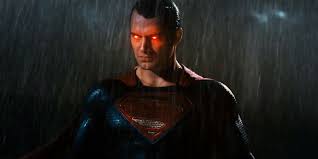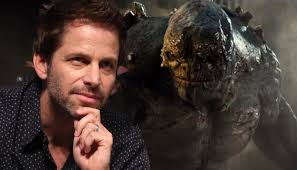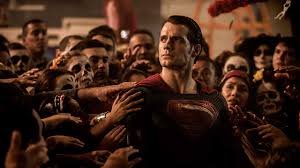Batman v Superman: Dawn Of Justice is a profoundly bad movie. Wrongheaded on, just, so many levels. The entire decision to go super grim n’ gritty with the Justice League is a bad one, but it’s also just done badly. Being dark does not mean that things have to be as humorless as this film*. The script is an embarrassing mess of pointless subplots, paper-thin motivations, needlessly convoluted structural devices, air-dropped set up for future movies, deeply unlikable characters and (I can’t believe I’m not making this up) jars of human urine. Scenes are jumbled together without any sense of flow or pace. Jesse Eisenberg’s Lex Luthor is a completely nonthreatening weirdo whose machinations stand up to no degree of scrutiny whatsoever but are complex and counterintuitive enough to require it. Its attempts to respond to complaints about the stunning callousness of Man Of Steel ’s setpieces feel sullen and half-hearted, and transform the heroes’ supposedly vibrant megalopoli into a series of abandoned warehouses. It has, had, and will always have an egregiously stupid title.
All those problems are with this movie specifically, and potentially fixable going forward. Spend a modicum of time working on a script with a basic story structure, punch up the dialogue and include the occasional joke. Introduce a new villain. Make the heroes aware of and concerned for the danger their battles pose to civilians, rather than just having a TV assure us this fight is occurring on a deserted backlot. Set the climactic throwdown somewhere other than a crater that looks like a smoldering cigar butt (between the ashy setting and the utterly uninspired design of Doomsday, it seems like BvS has simply exhausted its visual imagination by the finale). A little fuss, but not much muss. But the DCU is still pretty screwed up, even if Justice League: Dusk Of Equity is a more fundamentally competent movie than BvS. There are two big reasons for that, the two entities that DC/Warner Brothers have allowed to dictate the shape and direction of their cinematic universe: Zack Snyder and Marvel Studios.
Starting with Snyder, he is on one hand the perfect person to bring superhero action to the big screen. He has a distinct and impressive visual style, and is extremely adept at directing sleek, muscular action sequences – something that superhero films have frequently struggled to deliver, even as they dominated the action genre for the last decade. Superman’s first flight in Man Of Steel, the warehouse fight in Batman v Superman, these are some of the best realizations of the characters in action ever put to film, when viewed in isolation. The problems arise when it comes to stringing these fight scenes and bits of iconography into a complete story. That’s when the considerable strengths of Snyder the stylist are overwhelmed by the deficiencies of Snyder the storyteller.
Perhaps deficiency is too unkind, because I think more than anything the issue is that Snyder is just the worst possible fit for the Justice League. This snapped into place recently when the director revealed that his passion project is a feature adaptation of Ayn Rand’s Objectivist manifesto The Fountainhead. Suddenly, many of the stranger aspects of Man Of Steel and Batman v Superman made sense. Not the jar of pee, that’s still bizarre and gross, but the tonal elements that give so many fans of the print and animated versions of these characters fits make more sense coming from a Rand devotee. I’m not interested in debating the merits of her secular cult (though my phrasing is probably a giveaway of my judgment on that score), but you can see the militant atheism of that belief system expressing itself through the movie’s antipathetic depiction of Superman as an obtuse deity that needs to be drug down to earth. And its fetishization of selfishness and scorn for principles of charity and community mean that even the attempts to humanize the indestructible hero take the form of having him act surly and resentful that the useless plebs would have the gall to question or criticize their obvious superior. Objectivist Superman doesn’t even lift a finger to clean up the giant spaceships and superweapons that his battle with other aliens left lying around populated areas for two years**.
But I’m not saying that BvS is a bad movie because I disagree with the its politics, in part because I think it has far less to say politically than the amount of real and fictional politicians clogging up the screen would imply. Objectivism could have the real world pegged exactly right from top to bottom, and it would still make a bad fit for the Justice League. What I am saying is that when you take someone whose personal philosophy disdains the very ideas of heroism and teamwork and ask them to make a superhero team-up movie, it should maybe not be surprising when the result is a discordant, joyless slog. One with multiple scenes of Superman’s parents sagely advising him not to bother helping people. One where Batman and Superman fight without any real difference in objectives, but because they both seem to take for granted that it would be inappropriate to engage your enemy in discussion before you’ve pummeled them into submission. One where Wonder Woman literally drops out of the sky to engage in the climactic melee without ever exchanging a single word with Superman***. Batman v Superman’s climax is a grim funereal march to a sacrifice that could have been avoided with even the smallest bit of communication. Contrast this with The Avengers – whatever that movie lacks in dramatic lighting, there is a palpable joy its action climax, which is bursting with communication and interplay between the heroes as they unite to kick alien ass.
I’ll contrast two very particular moments from these climactic battles that I think aptly demonstrate the divide between the Marvel and DC cinematic universes. First is that sacrifice by Superman, which is great in theory. It riffs on Arthur’s death in Excalibur, one of my favorite dramatic/action beats in all of film, and allows for Superman to demonstrate that heroism isn’t about superpowers, but commitment and sacrifice. Which is all great, except that the only reason Superman should have to deliver the killing blow is that he not even acknowledging his ostensible allies. The Kryptonite spear is harmless to Wonder Woman and Batman, who has nothing to contribute to this fight after firing a single gas pellet. So naturally, it’s Superman who grabs literally the only thing in the world that can hurt him and makes a suicide run at the radioactive murderbeast. It’s the emotional crux of the film, and it’s only made possible by the utter dearth of cooperation and communication between the heroes.
On the other hand, there is a moment in The Avengers’ finale where we follow Iron Man flitting around various parts of the battle. In the middle of it, he stops next to where Captain America is battling some aliens for a second, and fires his hand blasters directly into Cap’s shield, which he uses to reflect the beam into the oncoming enemies. Then Iron Man flies off to check on Hawkeye or whatever. It is a brief, entirely uncommented upon moment, and it doesn’t even make any sense when you think about it. It accomplishes nothing that just blasting the aliens directly wouldn’t, so why risk shooting his friend (and at best, making him pause in the middle of a frantic melee) in process? The answer is no reason, except it’s a cool moment of the heroes bouncing off each other, a beat that wouldn’t be possible in either of their solo adventures.
Both movies have these moments of abject stupidity in their action finales, but the ends to which they are used speaks volumes. The death of Superman hinges on the DC heroes failing to make any effort to communicate or “team up” in their big team-up moment, and thus the giant, operatic emotional climax of movie and the foundation for the entire DCU going forward is laid on a foundation of dumbness. Whereas the Avengers moment is fleeting, inconsequential, and is in service of highlighting the heroes operating in effortless (to the point of nonsensical) sync. It’s playing into and off the inherent strength of the premise.
It may seem unfair to compare a major character death with a blink-and-you’ll-miss-it action beat, but I think it demonstrates a way in which the Marvel movies are constructed more intelligently than their counterparts, despite all DC’s self-conscious stylings as the more thoughtful, weighty alternative to the candy-colored disposability of the MCU. But the Marvel films, Avengers in particular, are more conscious of how an action sequence is telling a story even if there is no dialogue, and having that action reinforce the themes of the movie. Snyder seems oblivious to how his action conveys a message at odds with themes the dialogue pays lip service to, and as a result it feels like a glimpse of his true feelings peaking out, like a filmmaking Freudian slip.
It also makes the films seem, for all their insistence on their own profundity, dumber than they think they are. Whereas the Marvel films play it dumb, but their construction belies a sneaky intelligence at work. I’m not sure that this actually mean they are any smarter than the DC films on some sort of objective scale, but as with people, I’d much rather hang out with a movie that is smarter than it lets on than someone who may actually have an above-average IQ but is convinced they’re some sort of uber-genius. The former allows for even a movie like Age Of Ultron (which is something of a mess in its own right) to sneak up on you with something as unexpectedly poignant and insightful as the Vision and Ultron’s final exchange, while the latter leads to big, sweeping moments that fall flat.
BvS’s misstep is especially frustrating because it is so unnecessary. Let the heroes plan the attack a little, have Wonder Woman holding Doomsday in place with her lasso, Superman drawing away his energy blasts, and Batman charging in with the spear. Then he gets swatted aside, and Superman is forced to grab it himself and do the deed. This not only introduces something of a narrative thread to the sequence that feels like three heroes having three separate fights with the same opponent, but makes Superman seem less dumb, and also gives Batman added drive on a couple fronts going into Justice League. At the Supneral, he says “I failed him in life, I won’t fail him in death.” A nice sentiment, but one that rings hollow when he’s speaking of a man he spent 18 months plotting to kill and a few minutes working with (well, parallel to, at least). But if Superman sacrificed himself to save Batman, who tried so hard to kill him not an hour before? That is the kind of selfless heroism that could shame/inspire the jaded vigilante to venerate his memory. It would also mean that Superman died to save a familiar face, rather than the couple blocks of abandoned warehouses the movie assures us is all these people are fighting over. And Batman feeling like it was his own failure in the face of a superhuman threat that caused Supes’ death is a great motivator to gather up other powered individuals to fill the boots of the hero he didn’t appreciate while he was alive.
But Monday morning script doctoring aside, the foundation for the DC-CU has larger defects than Batman’s motivation being weaker than it needs to, or even Zach Snyder’s antisocial tendencies, which could be mitigated by subsequent filmmakers. Those filmmakers will still be saddled with broad conceptual issues hobbling this entire universe from its inception, because it was designed to first and foremost play catch up with the sprawling universe Marvel had already spent 5 years building up. But that will be the focus of a separate post.
*even the movie’s lone laugh line, where Batman and Superman ask each other if Wonder Woman is with him, is just weird in context – She’s with you, Bruce. Do you not remember when the movie stopped dead so you could add her to your Contacts List?
**Ironically, Snyder’s lack of belief in the concept of superheroes would seem to make him a great fit for another seminal comics adaptation, Watchmen. Unfortunately, that material only served to put the storyteller and stylist in Snyder at reverse odds; if any superhero story ever called for a stripped down, deglamorized visual aesthetic, it was Alan Moore’s brutal and skeptical deconstruction of cape n’ tights tropes. Instead Snyder delivered one of the glossiest looking movies ever made, undermining every attempt by the tremendous cast to expose the hidden ugliness and frailty beneath the character archetypes. Watchmen looks like a masterpiece, and is very faithful to source material that is a masterpiece. But it’s ultimately the difference rather than sum of those parts.
***I am shocked to find that as of this writing, it appears no one on the internet has inserted a cry of “LEEEEEROY JENKINS!!!” over a clip of her big entrance. You think you know a place…





